新概念英语第二册:第27课课文详解及语法解析.doc
新概念英语第二册27课课件

Exercise
【2016年淮安】It’s cold outside, Sandy. You’d better _____ your coat to keep warm.
A. put up
B. put out
C. put on
D. put away
Exercise
【2016年泰州】Firemen in Jingjiang together with those from other areas successfully the big fire after sixteen hours' hard work.
New words and expressions
4. smell (smelled/smelt, smelled/smelt) v. 闻起来
状态:She is dirty and wearing a shabby dress. 持续:keep, remain, stand(位于) 变化:The meat go bad because of the hot weather. 终止:The theory proved (to be) correct.
New words and expressions
2. wonderful adj. 极好的
【语言点】 • Fantastic! • Great! (与物相连,口语中用得更多) • Excellent! adj. 卓越的, 极好的(与人相连) • Outstanding! adj. (人) 杰出的,出色的 • Brilliant! adj. 灿烂的, 闪耀的, 有才气的
5. wind (wound, wound) v. 蜿蜒 n. 风
【语言点】 • wind one’s way 蜿蜒而行 • a winding path • wind back 倒回(磁带等) 【经典习题】 Against the fierce wind, he _w_o_u_n_d__h_i_s_w_a_y_.
新概念英语第二册:第26课课文详解及语法解析
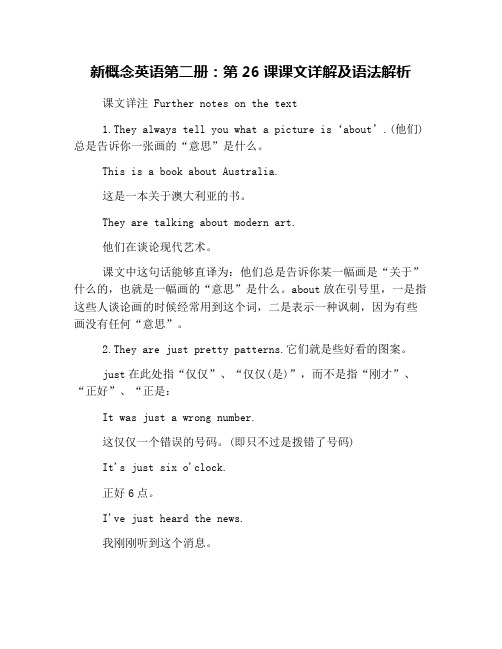
新概念英语第二册:第26课课文详解及语法解析课文详注 Further notes on the text1.They always tell you what a picture is‘about’.(他们)总是告诉你一张画的“意思”是什么。
This is a book about Australia.这是一本关于澳大利亚的书。
They are talking about modern art.他们在谈论现代艺术。
课文中这句话能够直译为:他们总是告诉你某一幅画是“关于”什么的,也就是一幅画的“意思”是什么。
about放在引号里,一是指这些人谈论画的时候经常用到这个词,二是表示一种讽刺,因为有些画没有任何“意思”。
2.They are just pretty patterns.它们就是些好看的图案。
just在此处指“仅仅”、“仅仅(是)”,而不是指“刚才”、“正好”、“正是:It was just a wrong number.这仅仅一个错误的号码。
(即只不过是拨错了号码)It's just six o'clock.正好6点。
I've just heard the news.我刚刚听到这个消息。
3.We like them in the same way that we like prettycurtain material.我们喜爱它们就像我们喜爱漂亮的窗帘布一样。
in the same way that/as是个连接短语,用于表示比较,可译为“像/和……一样”:She walks in the same way that/as her sister did.她的走路姿势和她姐姐以前走路的姿势一模一样。
4.I think that young children often appreciate modern pictures better than anyone else. 我觉得小孩子们往往比任何人都更能欣赏现代绘画。
新概念英语第二册第27课Lesson27

A Wet Night
Olivia
CONTENTS
01 R e v i e w 02 N e w w o r d s 03 G r a m m e r 04 H o m e w o r k
ONE
New Words
tent
(n)帐篷
field n. 田地,田野
put up a tent pitch a tent
★wind
v. 缠绕
wind the clock He wound the bandage round his ankle Can you wind the video back a little way - I want to see that bit again.
a winding path
right
take down a tent
停机坪 airfield a field of wheat
★smell
v. 闻起来
1.做及物动词 smell the fiowers 察觉出来: smell danger 2.做不及物动词:表示发出臭味 eg. Oh. your dog smells
Oh. it smells stink:发出恶臭; eg. The river stinks 3.作感官系动词:look 看起来 sound 听起来 taste 尝起来 feel 摸起来
run I run out of the room hurry dash rush
The stream wound its way across the field and then flowed right under their tent!
wind one’s way +介词: 蜿蜒而行 She wound her way through the crowds. The river winds its way into the sea The Highway winds its way along the coast.
新概念第二册第二十七课
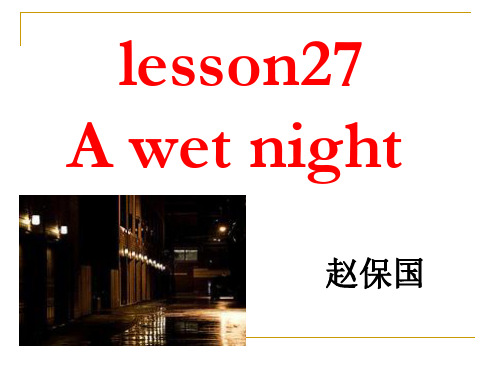
赵保国
What is camping?
Camping is an outdoor activity.
Useful expressions about camping camper ['kæmpə] 露营者
campground ['kæ mpɡrəund] 野营地,露营场所
★wind
(wound;wound)
v. 蜿蜒
wind one‘s way 蜿蜒而行
n. 风;v. 刮风 用法:right 做副词时强调后边的形容词, 副词, 介词 短语, 不强调动词 Right here.就在这儿 注意:后边加代词时只能用just. 如 : just you 就是 你了. 不能用 right代替 just like 正好/just as 正如
leap v. 跳跃, 跳起(有距离) ★ heavily adv. 大量地,浓密地,繁茂地
rain/snow heavily 一般与雨雪连用 smoke heavily 烟瘾重 例句:这棵树生长得十分茂密。 This tree is growing heavily.
★form
v. 形成
★sleeping bag
睡袋
动词加ing 变成形容词作定语有两个意思 : ① 正在…… 如:sleeping dog passing plane 正在路过的飞机 ② 用来做…… 如:sleeping bag listening material 听力材料; walking stick 拐杖
folding chair折叠椅
flashlight ['flæ ʃ,lait]手电筒
新概念英语第二册27课

Key structures-过去式
• • • • • 3 表示一种情绪 I heard it ! 我已经听到了!(你不用再喊了) I told you so. 我早告诉你了。(你就是不听)
Key structures-过去式
4 不规则动词变化
• • • • • • • • •
cost Cut Learn Hear Spend Bring Buy Stand understand
As soon as over an open fire
They-hungry smelled good
wonderful stories-songs by the campfire
But-later began to
felt tired put warm-comfortable -soundly
讲故事
tell stories
讲笑话 一会后 下雨了 感到疲惫 熄灭火 温暖又舒适 睡得香甜
tell jokes after a moment /some time later It began to rain
feel tired
put out the fire warm and comfortable sleep soundly
What is camping?
Camping is an outdoor activity.
Useful expressions about camping camper ['kæmpə] 露营者
campground ['kæ mpɡrəund] 野营地,露营场所
What do we have to take when we go camping?
午夜
新概念英语第2册课程讲义Lesson27
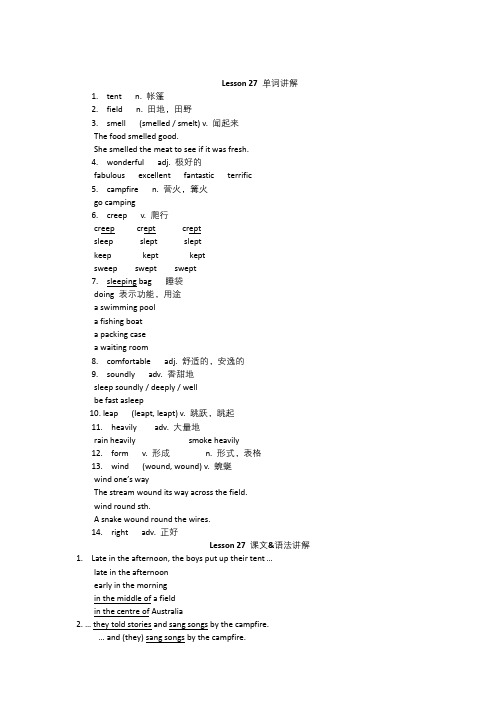
Lesson 27 单词讲解1. tent n. 帐篷2. field n. 田地,田野3. smell (smelled / smelt) v. 闻起来The food smelled good.She smelled the meat to see if it was fresh.4. wonderful adj. 极好的fabulous excellent fantastic terrific5. campfire n. 营火,篝火go camping6. creep v. 爬行creep crept creptsleep slept sleptkeep kept keptsweep swept swept7. sleeping bag 睡袋doing 表示功能,用途a swimming poola fishing boata packing casea waiting room8. comfortable adj. 舒适的,安逸的9. soundly adv. 香甜地sleep soundly / deeply / wellbe fast asleep10. leap (leapt, leapt) v. 跳跃,跳起11. heavily adv. 大量地rain heavily smoke heavily12. form v. 形成n. 形式,表格13. wind (wound, wound) v. 蜿蜒wind one’s wayThe stream wound its way across the field.wind round sth.A snake wound round the wires.14. right adv. 正好Lesson 27 课文&语法讲解1. Late in the afternoon, the boys put up their tent …late in the afternoonearly in the morningin the middle of a fieldin the centre of Australia2. … they told stories and sang songs by the campfire.… and (they) sang songs by the campfire.by the campfireI like sitting by the Wayle on fine afternoons.3. But some time later it began to rain.some timesometimebegin began begunsing sang sungring rang rungdrink drank drunkswim swam swum4. ... two boys woke up and began shouting.wake woke wokenwaked wakedbegin doing sth. = begin to do sth.1). … put …2). … was done … cooked …3). … were … smelled …4). … told … sang …5). … began …6). … felt … put … crept …7). … were … slept …8). … woke … began …9). … was …10). … leapt … hurried …5. It was raining … and they found that a stream had formed…It was raining …they found …a stream had formed …Lesson 27 知识拓展Key points: 一般过去时形式:V.过去式(did) 用法:Lastsummer I went to Italy. 填入动词的适当形式(改编自高考阅读全国)•Last night I was driving from Harrisburg to Lewisburg, a distance of about eighty miles.•It ________ (be) late.•Several times I ________ (get) stuck behind a slow-moving truck …and I ________ (become) increasingly impatient.填入动词的适当形式(改编自高考阅读全国)•At one point along an open road, I ________ (come) to a crossing with a traffic light.•I ________ (be) alone on the road by now, but as I ________ (drive) near the light, it ________ (turn) red and I ________ (make) a stop.•Last night I was driving from Harrisburg to Lewisburg, a distance of about eighty miles.•It was late.•Several times I got stuck behind a slow-moving truck …and I became increasingly impatient.•At one point along an open road, I came to a crossing with a traffic light.•I was alone on the road by now, but as I drove near the light, it turned red and I made a stop.Just use this room for the time being, and we’ll offer you a larger one ______ it becomes available.A. as soon asB. unlessC. as far asD. until( 安徽33)Just use this room for the time being, and we’ll offer you a larger one ______ it becomes available.A. as soon asB. unlessC. as far asD. until( 安徽33)。
新概念英语第二册Lesson-27-A-wet-night
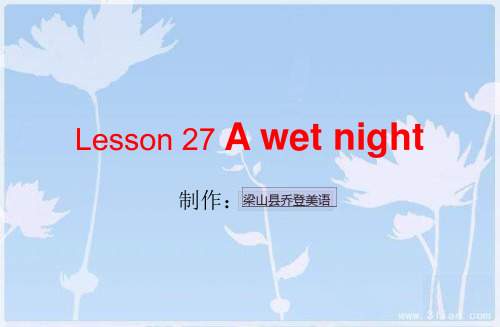
Put sb. up-安排住宿: • We can put you up for tonight.
• Put up with-容忍、忍受: • I cannot put up with him any longer. Put down-抄下: • put down the sentences Put off-推迟、延期: Don't put off until tomorrow what can be done today. 今日可做的事不要拖到明天。 Put away-放到一边: • put your toys away and go to bed
例句:他是他所在领域内的专家。 He is an expert in his field. football field 足球场地
2. 领域
battle field
战场
Smell 嗅 v.闻起来 1.vt 闻 smell v.闻起来 The tiger smelled the meat and 过去式和过去分词 :smelled / smelled went away.smelt/smelt 2.vi 闻起来…..气味 散发…..气味 This fish smells bad. smell +形容词 常见错误: Smell 是系动词,后接形容词 food 3.The 气味 n smelt well. 不能说成 “ smell well ” , I can’t stand the smell in this room
他不能逆潮流行事。 4.(按能力分的)班级,组
She is in the A stream.
她在A班。
form
v. 形成 n.表格
(1) vi.形成,产生: During the conversation, an idea formed in his mind. 在谈话的过程中,他有了一个主意。 Ice forms when it is cold enough. 如果冷到一定的程度,冰就会形成。 (2)n.形状,外形: I don't like the form of the cake. 我不喜欢这蛋糕的形状。 (3)n.表格: If you want to enter for the competition, you must fill in these forms. 如果你想报名参加比赛,你必须填写这些表格。
新概念英语第二册lesson27

They woke up and began shouting, the tent was full of water.
Late in the afternoon: put up
cooked a meal ---- hungry / smelled good
/raIt/
adv.正好
/smel/(smelled or smelt /smelt/) v.闻起来
What can you do in the forest or on the field? What happened to the boys?
Listen to the tape and answer my question:
leapt out ---- hurried outside
stream had formed ---- wound its way across the
一般过去时(simple past tense)
概念:表示过去某个时间里发生的动作或存在的状态,常和表示过 去的时间状语连用,如:yesterday,last night,in 1990,two days ago等。 一般过去时也表示过去经常或反复发生的动作,常和often,always等 表示频率的时间状语连用。
过去习惯性、经常性的动作、行为;过去主语所具备的能力和性格。 一般过去时不需考虑三单。
动词的规则变化:
①直接加ed:work—— worked look——looked play——played, ②以不发音e结尾的单词,直接加d:live ——lived hope——hoped use—
—used, ③以辅音字母+y结尾的,变y为i加ed:study—— studied carry——
新概念第二册第27课课件

comfortable
• comfortable adj. 舒适的 ←→ uncomfortable • a comfortable chair 一把舒适的椅子 • a comfortable car 一辆舒适的车子 • eg. Make yourself comfortable! 请别客气! • comfortably adv. 舒适地 =in comfort • eg. She sat in the sofa comfortably. • /She sat in the sofa in comfort.
smell v. 嗅到(实意动词)
• • • • eg. I can smell trouble coming. eg. I smelled something burnt. smell round/smell about 东嗅西嗅 eg. The dogs were smelling round,perhaps they smelt the thief. • smell of 带有…气味(指令人不快的气味) • eg. Your breath smells of brandy. • eg. The house smells of paint.
3、As soon as this was done, they cooked a meal over an open fire. open fire 在野外生的火, 篝火,盆火(指无遮盖的、没有围起来 的火) cook a meal 做一顿饭 4、After a wonderful meal, they told stories and sang songs by the campfire. 表示“在……之后”的句式:after+从句/doing/n. after I arrived = After my arrival 在我到达之后 when the plane arrived =after the arrival of the plane After his arrival, we have a party. After the arrival of the flowers, I took them and went to my girlfriend's. At 在……旁边: at the door 门边, (紧挨着的) sit at the table 桌边 by 在……旁边,靠近 (不会紧挨着的, 但也不会很远,通常指 距离非常近) Come and sit by me. There are many trees by the river. next to He sits next to me./who is the next? (表示紧邻着的)
新概念英语第二册Lesson 27 A Wet Night(课文、详解、练习)讲义
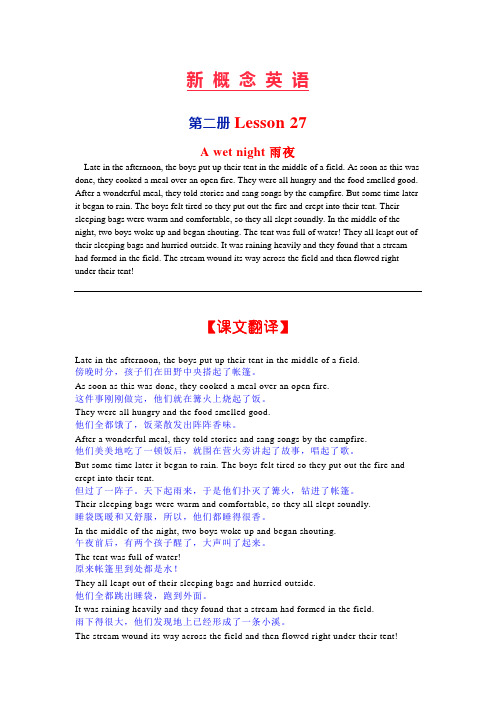
新概念英语第二册Lesson 27A wet night雨夜Late in the afternoon, the boys put up their tent in the middle of a field. As soon as this was done, they cooked a meal over an open fire. They were all hungry and the food smelled good. After a wonderful meal, they told stories and sang songs by the campfire. But some time later it began to rain. The boys felt tired so they put out the fire and crept into their tent. Their sleeping bags were warm and comfortable, so they all slept soundly. In the middle of the night, two boys woke up and began shouting. The tent was full of water! They all leapt out of their sleeping bags and hurried outside. It was raining heavily and they found that a stream had formed in the field. The stream wound its way across the field and then flowed right【课文翻译】Late in the afternoon, the boys put up their tent in the middle of a field.傍晚时分,孩子们在田野中央搭起了帐篷。
新概念第二册27

Did they all feel hungry? Yes, they did. What did they do after their meal? They told stories and sang songs. When did it began to rain? Some time later. Why did the boys put out the fire? Because they felt tied.
What happened to the boys in the night? It rained so heavily in the night that a stream formed right under the boys’ tent. When did the boys put up their tent? Late in the afternoon. Where did they put it up? In the middle of a field. What did they do next? They cooked a meal.
★sleeping bag
Байду номын сангаас
睡袋 动词加ing 变成形容词作定语有两个意思 : ① 正在…… 如: a sleeping dog a passing plane ② 用来…… 如: sleeping bag listening material 听力材料; walking stick 拐杖
comfortable a. 1. 舒适的, 安逸的 2. 丰富的 ,充裕的 他的收入很可观。
4、After a wonderful meal, they told stories and sang songs by the campfire. 表示“在……之后”的句式: after+从句/doing/n. after he arrived => After his arrival 在他到达之后 After his arrival, we have a party. After I have finished my homework, I went out. = After having finished my homework, I went out.
新概念第二册lesson27详解

Lesson 27 A wet night词汇学习★late 迟的, 晚的, 末期的, 最近的, 已故的后来, 稍后, 不久;更迟的, 后面的latest 最近的,最新的,最后的;形容词late的最高级形式★put 放置put aside保留;把…放在一边,暂不考虑put away放好,收好put back恢复正常;把…放回原处put down记下put forward提出(要求、事实等) put off推迟,推延put on穿上,戴上;上演;增加(体重) put up with容忍,忍受put out关(灯);熄灭;出版,发布;伸出;生产put into practice实施,实行put up举起;提高;建造;张贴put into effect 实行,生效put through 为…接通电话,接通(电话) put...in place把…放在合适的位置put into operation实施,使生效,使运行★tent 帐篷tend 1. (to)趋向, 易于, 朝向 2.照料, 照管★field n. 田地,田野airfield 飞机场(介词用on)airport 机场in the field 实地, 野外, 在战地, 在作战, 在参加比赛in one's field 在...领域He is an expert in his field.football field 足球场地★as soon as 一…就…强调两个动作几乎是连在一起的。
As soon as the thief saw the policeman, he ran away.表示“一…就…”as soon as,hardly…when…,no sooner…than…这三个短语都有“一……就”、“刚刚……就”的意思,它们的意思非常相近,因此有时可以互换。
例如:“我刚到公共汽车站,汽车就开了。
”一句,就可以有如下几句译法:As soon as I got to the bus stop, the bus started.Hardly had I got to the bus stop when the bus started.No sooner had I got to the bus stop than the bus started.no sooner...(主句)than... (从句)引导时间状语从句,主句用过去完成时,"than"后面的从句用一般过去时. 例: I had no sooner reached home than it began to rain. 我一到家天就下起雨来No sooner ...than...常放在句首,表示强调.这时主句要倒装.例:No sooner had I reached home than it began to rain.hardly ...(主句)when (从句)意思为:"还没...就..."主句用过去完成时, 从句用一般过去时例: We had hardly gotten there when it began to rain. 我们还没到那儿,天就下起雨了.(主句用过去完成时,从句用一般过去时)Hardly...when...也常放在句首同样主句也需要倒装例: Hardly had we gotten there when it began to rain.★as … as possible 尽可能的** as soon / quick / fast / slowly as possible 尽可能的快/慢★over 介词prep.1. 在...之上,在正上方We live over a small bookstore. 我们住在一家小书店的楼上。
新概念英语第二册:第26课课文详解及语法解析
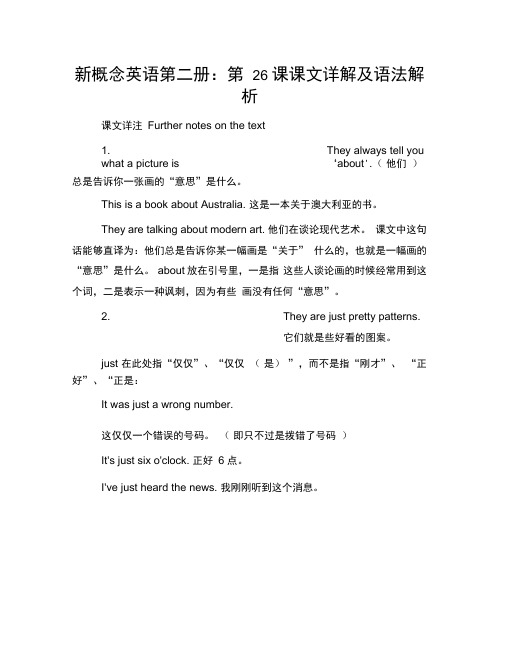
新概念英语第二册:第26 课课文详解及语法解析课文详注Further notes on the text1. They always tell youwhat a picture is ‘about'.(他们)总是告诉你一张画的“意思”是什么。
This is a book about Australia. 这是一本关于澳大利亚的书。
They are talking about modern art. 他们在谈论现代艺术。
课文中这句话能够直译为:他们总是告诉你某一幅画是“关于” 什么的,也就是一幅画的“意思”是什么。
about 放在引号里,一是指这些人谈论画的时候经常用到这个词,二是表示一种讽刺,因为有些画没有任何“意思”。
2. They are just pretty patterns.它们就是些好看的图案。
just 在此处指“仅仅”、“仅仅(是)”,而不是指“刚才”、“正好”、“正是:It was just a wrong number.这仅仅一个错误的号码。
(即只不过是拨错了号码)It's just six o'clock. 正好6 点。
I've just heard the news. 我刚刚听到这个消息。
3. We like them in the same way that we like pretty curtain material. 我们喜爱它们就像我们喜爱漂亮的窗帘布一样。
in the same way that/as 是个连接短语,用于表示比较,可译为“像/和........... 一样”:She walks in the same way that/as her sister did.她的走路姿势和她姐姐以前走路的姿势一模一样。
4.I think that young children often appreciate modern pictures better than anyone else. 我觉得小孩子们往往比任何人都更能欣赏现代绘画。
新概念英语第二册:第27课课文详解及语法解析.doc
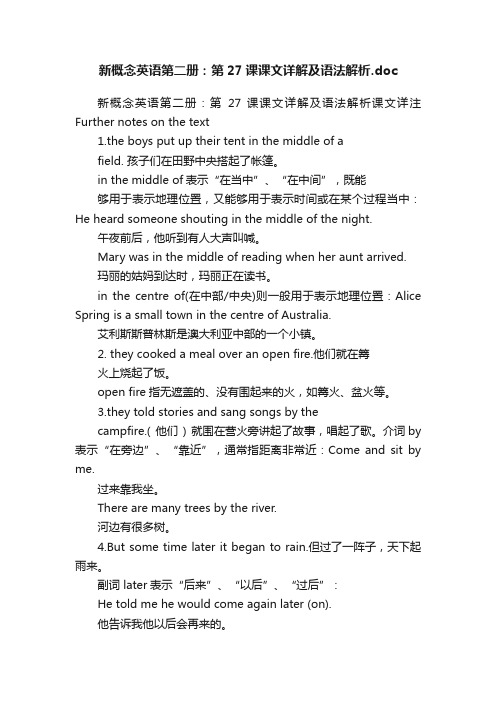
新概念英语第二册:第27课课文详解及语法解析.doc新概念英语第二册:第27 课课文详解及语法解析课文详注Further notes on the text1.the boys put up their tent in the middle of afield. 孩子们在田野中央搭起了帐篷。
in the middle of表示“在当中”、“在中间”,既能够用于表示地理位置,又能够用于表示时间或在某个过程当中:He heard someone shouting in the middle of the night.午夜前后,他听到有人大声叫喊。
Mary was in the middle of reading when her aunt arrived.玛丽的姑妈到达时,玛丽正在读书。
in the centre of(在中部/中央)则一般用于表示地理位置:Alice Spring is a small town in the centre of Australia.艾利斯斯普林斯是澳大利亚中部的一个小镇。
2. they cooked a meal over an open fire.他们就在篝火上烧起了饭。
open fire指无遮盖的、没有围起来的火,如篝火、盆火等。
3.they told stories and sang songs by thecampfire.( 他们) 就围在营火旁讲起了故事,唱起了歌。
介词by 表示“在旁边”、“靠近”,通常指距离非常近:Come and sit by me.过来靠我坐。
There are many trees by the river.河边有很多树。
4.But some time later it began to rain.但过了一阵子,天下起雨来。
副词 later表示“后来”、“以后”、“过后”:He told me he would come again later (on).他告诉我他以后会再来的。
新概念第二册Lesson 27教案详解(单词,课文,语法)
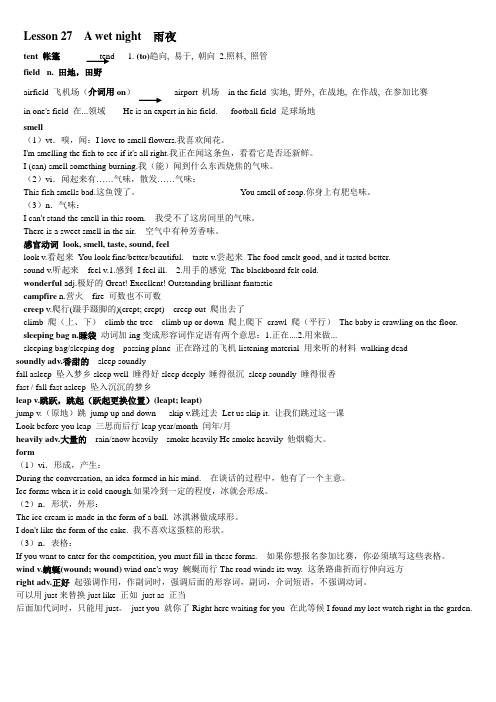
Lesson 27 A wet night 雨夜tent 帐篷tend 1. (to)趋向, 易于, 朝向2.照料, 照管field n. 田地,田野airfield 飞机场(介词用on)airport 机场in the field 实地, 野外, 在战地, 在作战, 在参加比赛in one's field 在...领域He is an expert in his field. football field 足球场地smell(1)vt.嗅,闻:I love to smell flowers.我喜欢闻花。
I'm smelling the fish to see if it's all right.我正在闻这条鱼,看看它是否还新鲜。
I (can) smell something burning.我(能)闻到什么东西烧焦的气味。
(2)vi.闻起来有……气味,散发……气味:This fish smells bad.这鱼馊了。
You smell of soap.你身上有肥皂味。
(3)n.气味:I can't stand the smell in this room. 我受不了这房间里的气味。
There is a sweet smell in the air. 空气中有种芳香味。
感官动词look, smell, taste, sound, feellook v.看起来You look fine/better/beautiful. taste v.尝起来The food smelt good, and it tasted better.sound v.听起来feel v.1.感到I feel ill. 2.用手的感觉The blackboard felt cold.wonderful adj.极好的Great! Excellent! Outstanding brilliant fantasticcampfire n.营火fire 可数也不可数creep v.爬行(蹑手蹑脚的)(crept; crept) creep out 爬出去了climb 爬(上、下)climb the tree climb up or down 爬上爬下crawl 爬(平行)The baby is crawling on the floor. sleeping bag n.睡袋动词加ing变成形容词作定语有两个意思:1.正在....2.用来做...sleeping bag/sleeping dog passing plane 正在路过的飞机listening material 用来听的材料walking deadsoundly adv.香甜的sleep soundlyfall asleep 坠入梦乡sleep well 睡得好sleep deeply 睡得很沉sleep soundly 睡得很香fast / fall fast asleep 坠入沉沉的梦乡leap v.跳跃,跳起(跃起更换位置)(leapt; leapt)jump v.(原地)跳jump up and down skip v.跳过去Let us skip it. 让我们跳过这一课Look before you leap 三思而后行leap year/month 闰年/月heavily adv.大量的rain/snow heavily smoke heavily He smoke heavily 他烟瘾大。
新概念英语第二册第27课课件

comfort (v.) 安慰
comfort sb.
(n.) 舒适
live in comfort
comfortable (adj.) 舒适的,安逸的
a comfortable bed
feel comfortable
uncomfortable
comfortablcomfortably
02
go for a camp
03
(v.)野营
04
go camping
05
campfire (n.) 篝火,营火
06
= open fire
creep (v.) 爬行
creep - crept – crept
creep into sp.
creep into the tent
creep out of sp.
单击此处添加小标题
Lesson 27 A wet night
单击此处添加小标题
New words and expressions
单击此处添加小标题
tent (n.) 帐篷
单击此处添加小标题
put up a tent
单击此处添加小标题
搭帐篷
field (n.) 田野,田地
work in the field
10
Lesson 27 A wet night Late in the afternoon, the boys put up their tent in the middle of a field. late in the afternoon 在傍晚,在黄昏 early in the morning 在清晨,在凌晨 put up 搭建; 举起 Put up your hands, please. in the middle of 地理位置/时间/空间 in the centre of 地理位置 in the middle of the night = at midnight
新概念英语第二册课后题答案详解:Lesson27
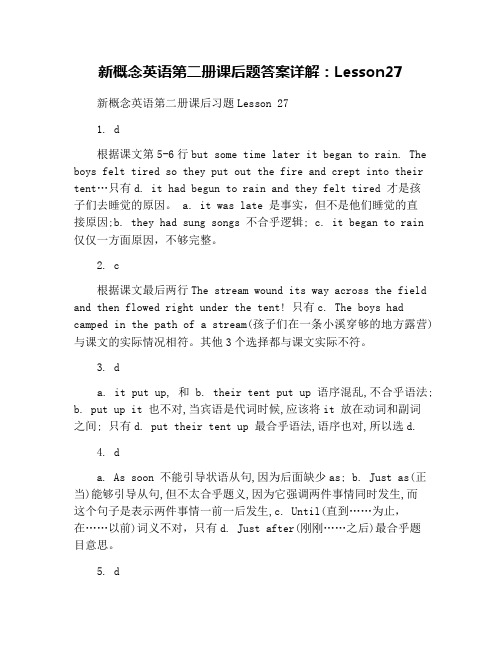
新概念英语第二册课后题答案详解:Lesson27新概念英语第二册课后习题Lesson 271. d根据课文第5-6行but some time later it began to rain. The boys felt tired so they put out the fire and crept into their tent…只有d. it had begun to rain and they felt tired 才是孩子们去睡觉的原因。
a. it was late 是事实,但不是他们睡觉的直接原因;b. they had sung songs 不合乎逻辑; c. it began to rain 仅仅一方面原因,不够完整。
2. c根据课文最后两行The stream wound its way across the field and then flowed right under the tent! 只有c. The boys had camped in the path of a stream(孩子们在一条小溪穿够的地方露营)与课文的实际情况相符。
其他3个选择都与课文实际不符。
3. da. it put up, 和b. their tent put up 语序混乱,不合乎语法;b. put up it 也不对,当宾语是代词时候,应该将it 放在动词和副词之间; 只有d. put their tent up 最合乎语法,语序也对,所以选d.4. da. As soon 不能引导状语从句,因为后面缺少as;b. Just as(正当)能够引导从句,但不太合乎题义,因为它强调两件事情同时发生,而这个句子是表示两件事情一前一后发生,c. Until(直到……为止,在……以前)词义不对,只有d. Just after(刚刚……之后)最合乎题目意思。
5. da. they had hunger 不符合英语习惯用法;b. they had hungry 不合乎语法,hungry 是形容词,它前面应该是系动词be,而不是had;c. they were hunger 不合乎语法,系动词were 后面应该跟形容词hungry; 只有d. they felt hungry 最符合语法,所以选d.6. b只有选b. near 才能同前一句中的by the campfire(在篝火旁)意思相同。
新概念英语第二册 27 课
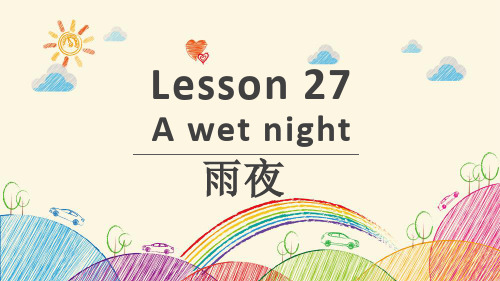
A wet night
雨夜
What is camping?
Camping is an outdoor activity.
教In学t内ro容duction
What do we have to
take when we go
camping?
您的内容打在这里,或者通 过复制您的文本后,在者通 过复制您的文本后,在此框 中选择粘贴,并选择只保留 文字。
[kriːp] creep v.爬行 (crept, crept)
教N学e内w容words
tent field smell
帐篷 田地,田野 闻起来
wonderful campfire
极好的 您的内容打在这里,或者通 过复制您的文本后,在此框
[ˈhevɪli] heavily adv. 大量地 rain/snow heavily 一般与雨雪连用 现在外面雨下得很大。 It's raining heavily outside.
教N学e方w案words
[striːm] stream n. 溪,川
river 河 lake 湖 sea 海
教N学e方w案words
教N学e内w容words
[ˈwʌndəfl] wonderful adj. 极好的
口语中用得更多的是 :
Great ! (与物相连)
您的内容打在这里,或者通
过复制您的文本后,在此框
excellent (与人相连) 中选择粘贴,并选择只保留
文字a。 dj.卓越的, 极好的
She is such a excellent painter! 她是一位多么优秀的画家!
牛排的熟度
Rare:一成熟
- 1、下载文档前请自行甄别文档内容的完整性,平台不提供额外的编辑、内容补充、找答案等附加服务。
- 2、"仅部分预览"的文档,不可在线预览部分如存在完整性等问题,可反馈申请退款(可完整预览的文档不适用该条件!)。
- 3、如文档侵犯您的权益,请联系客服反馈,我们会尽快为您处理(人工客服工作时间:9:00-18:30)。
新概念英语第二册:第27 课课文详解及语法解析课文详注 Further notes on the text
1.the boys put up their tent in the middle of a
field. 孩子们在田野中央搭起了帐篷。
in the middle of表示“在当中”、“在中间”,既能
够用于表示地理位置,又能够用于表示时间或在某个过程当中:He heard someone shouting in the middle of the night.
午夜前后,他听到有人大声叫喊。
Mary was in the middle of reading when her aunt arrived.
玛丽的姑妈到达时,玛丽正在读书。
in the centre of(在中部/中央)则一般用于表示地理位置:Alice Spring is a small town in the centre of Australia.
艾利斯斯普林斯是澳大利亚中部的一个小镇。
2. they cooked a meal over an open fire.他们就在篝
火上烧起了饭。
open fire指无遮盖的、没有围起来的火,如篝火、盆火等。
3.they told stories and sang songs by the
campfire.( 他们 ) 就围在营火旁讲起了故事,唱起了歌。
介词by 表示“在旁边”、“靠近”,通常指距离非常近:Come and sit by me.
过来靠我坐。
There are many trees by the river.
河边有很多树。
4.But some time later it began to rain.但过了一阵子,天下起雨来。
副词 later表示“后来”、“以后”、“过后”:
He told me he would come again later (on).
他告诉我他以后会再来的。
I met her again a few days later.
几天以后我又遇见了她。
5.The stream wound its way across the field and then
flowed right under their tent! 那小溪弯弯曲曲穿过田野,然后正好从他们的帐篷底下流过去!
(1)wind 表示“曲折而行”时,既能够是及物动词,又能够是不
及物动词:
The car wound through the village.
汽车曲曲折折地穿过村子。
The river winds its way through this district.
这条河弯弯曲曲地流经这个地区。
(2)right在此处表示强调,意为“正好”、“恰恰”、“就”。
这种用法多见于口语中:
I met him right here.
我就是在这里见到他的。
He hit the man right on the nose.
他正好打中那人的鼻子。
语法 Grammar in use
一般过去时 (cf. 第 3 课语法 )
在并列句中,各分句在时态上通常要保持一致。
在叙述过去发生的事件时,动词基本上都用一般过去时,但有时也会出现过去完成时
和过去实行时,它们的同时使用并不违反动词的“一致原则”:They all leapt out of their sleeping bags and
hurried outside. It was
raining heavily and they found that a stream had formed in
the field.
他们全都跳出睡袋,跑到外面。
雨下得很大,他们发现地上已经形成了一条小溪。
因为一般过去时常常表示过去某个特定的时间发生的事件,所以,它常与 when,where 等疑问词连用。
除了时间状语能够表示特定的时间之外,地点状语也能够暗示或包括特定的时间:
Where did you last see her?
你最近在什么地方见过她?
一般过去时与一般现在时在上下文中同时使用能够表示对比:
He always enjoys meals.
他吃饭时胃口总是很好。
Oh,does he?He didn't enjoy meals yesterday.
是吗 ?他昨天的胃口可不好。
